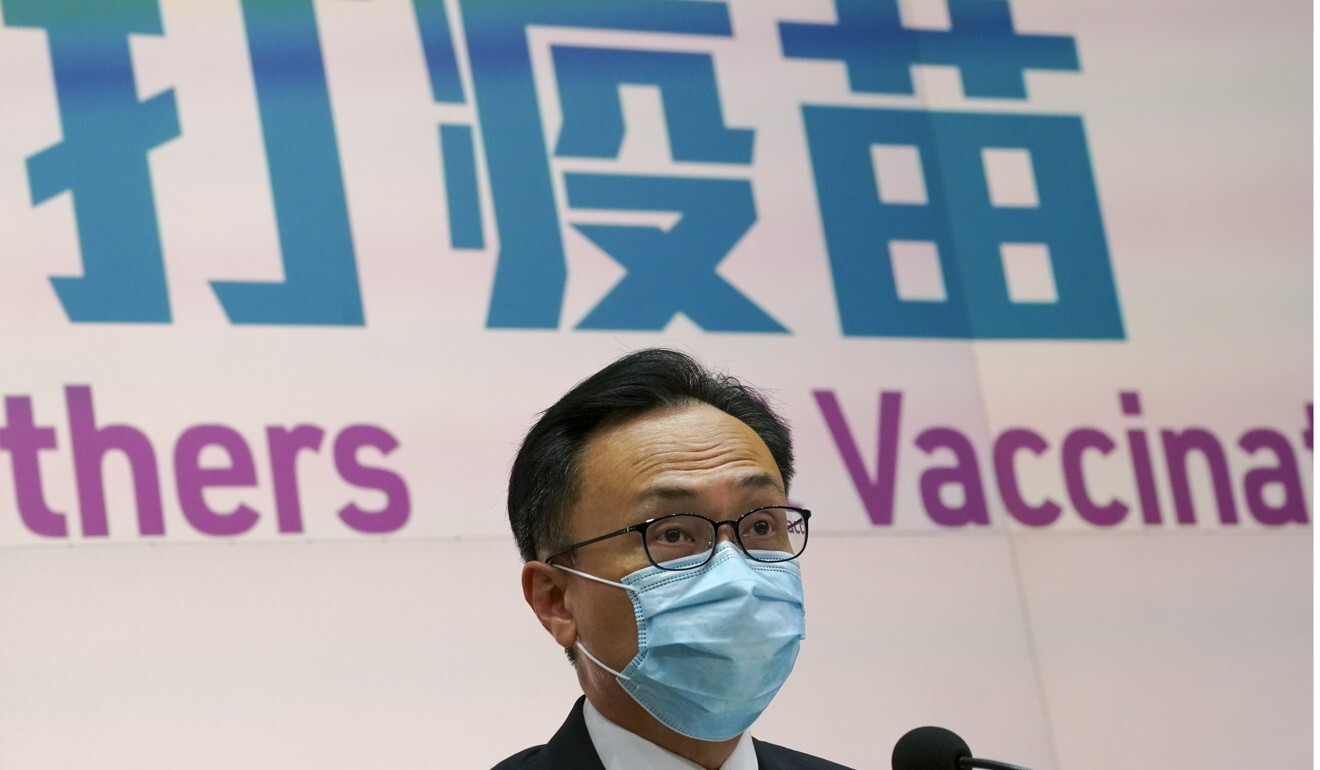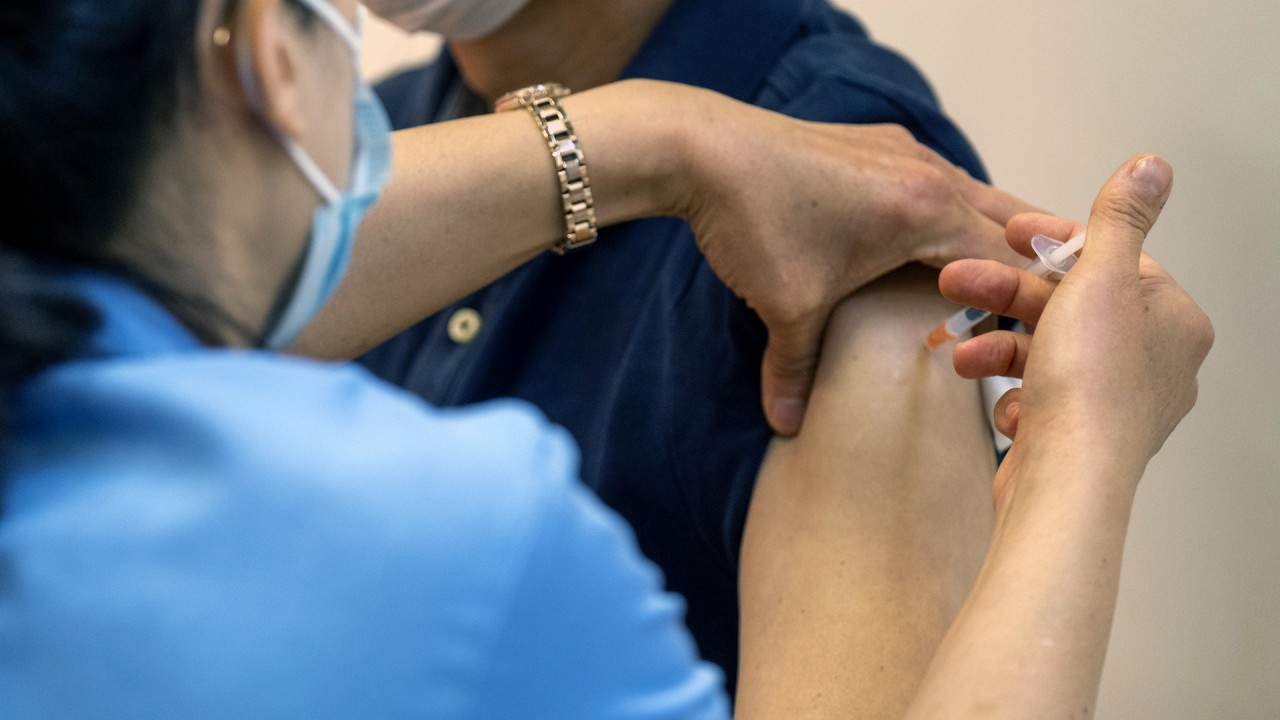
Coronavirus: Hong Kong expands vaccines to 5.5 million people, while experts find no evidence directly linking Sinovac jabs to seven deaths
- Age threshold for recipients is lowered to 30, while domestic helpers and students studying overseas also now eligible
- Expert committee says the deaths of seven people after receiving China-made vaccine not directly tied to the shots based on initial findings
The announcement came on Monday even as experts monitoring the Covid-19 inoculation scheme concluded, based on preliminary findings, that all seven deaths in the past two weeks involving chronically ill patients could not be directly linked to the Chinese-manufactured Sinovac shots they had received.
The experts also revealed that one more person had suffered from facial paralysis symptoms after receiving the jab, but again could not establish any connection.
About 80 per cent of the population aged 16 or above, including domestic helpers and students studying overseas, would be able to book vaccination appointments from 9am on Tuesday, Nip said.
“Based on the experience in the past 18 days, we notice that there is still capacity to handle more and there are people who do not belong to the priority groups but who wish to be vaccinated early,” he said.
“The present expansion of the priority groups to include those aged 30 and above basically is to make more people who wish to be vaccinated get the vaccine and also to streamline the administrative arrangements.”
Nip said the aim was to have most of the city’s 7.5 million people vaccinated by the end of the year, and more centres would be opened to administer BioNTech, the second vaccine being rolled out across the city with a current take-up rate of about 90 per cent, compared with 72 per cent for the Sinovac jabs.
“People aged 30 or older make up the majority of the city’s working population,” he added. “Quite a lot of domestic workers also need to help take care of elderly people, children and the disabled. Some hourly paid workers also serve more than one family, therefore it is appropriate to include domestic workers at an earlier stage.”
As of Monday night, about 206,000 people had received their first vaccine shot.

Nip said people would not need to present any proof of occupation when booking shots, although they would be advised to provide the information for statistical purposes.
Health minister Professor Sophia Chan Siu-chee said the city’s overall vaccination rate would be one factor authorities would consider when deciding when borders could reopen.
“The vaccination rate is one of the considerations in whether our border-control measures will be eased in the future,” Chan said, adding that other jurisdictions might also monitor the vaccination progress in deciding whether to open their doors to Hongkongers.
“If there is a fluctuation in the epidemic and the number of confirmed cases remains at a high double-digit level, together with an unsatisfactory vaccination rate, for the sake of public health, inevitably we would need to consider tightening social-distancing measures or even closing down some venues,” Chan said.
“However, if our vaccination rate is satisfactory and the public complies with other epidemic measures … restrictions on restaurants and venues of other business activities could be further relaxed.”

01:18
Hong Kong expands Covid-19 vaccination eligibility to residents aged 30-59
The easing could include reopening premises currently closed and full resumption of classes at schools.
Chan also offered assurances to the public that the two vaccines currently available, Sinovac and BioNTech, were “safe and effective”.
AstraZeneca-Oxford jabs would be delivered around late June or early July as scheduled, Chan said, despite some countries temporarily suspending the roll-out after some reported blood clotting incidents.
Following a meeting on Monday afternoon, the Expert Committee on Clinical Events Assessment Following Covid-19 Immunisation said the deaths of seven people who received the Sinovac vaccination were not linked to the shots based on initial findings.
At least six of the seven people had a serious heart condition or suffered from serious vessel blockage, while the remaining individual had tearing of a major blood vessel, which led to a stroke. The committee said it was still waiting for more details before drawing a final conclusion on whether there were causal links between the vaccines and the deaths.
A 63-year-old man suffering from pre-existing conditions including chronic heart failure and fatty liver died on Sunday after receiving the vaccine last Tuesday.
Covid-19 infections shut down US consulate in Hong Kong; city expecting about 30 cases
“The committee had made some initial comparisons between the reported deaths [after vaccinations] and past death rates of similar demographics, concerning mainly coronary artery diseases and cerebrovascular diseases. At the moment we haven’t seen any abnormal conditions,” said committee co-convenor Professor Ivan Hung Fan-ngai, adding that heart diseases was the third-leading killer in Hong Kong.
The committee also revealed a second case of Bell’s Palsy in which a 57-year-old man developed the temporary facial paralysis hours after receiving the Sinovac jab.
Authorities revealed last week that a 69-year-old man also suffered from Bell’s Palsy following the same jab. He was discharged from hospital on Monday.
Describing both cases as “not serious”, Hung said no causal relationship with the vaccine could be established at the moment.
“The usual onset of Bell’s Palsy secondary to vaccination is usually a few weeks’ time, around four to eight weeks,” he said. “These [local] cases actually presented Bell’s Palsy within a day. The time frame is a little bit unusual. As a result, we cannot confirm whether it is due to the vaccine itself.”
Viral infection could also be the cause, he added.
The Department of Health also issued fresh advice to family doctors on whether they should administer the Sinovac vaccine to people with chronic illnesses.
While anyone with a history of allergies to ingredients used in the vaccine are among those who are barred from receiving the shot, the guideline also listed which people would need to have their inoculation deferred, including recent heart attack or stroke patients.
Growing gym cluster leaves embattled Hong Kong fitness industry licking its wounds
Family practitioner Dr Lam Wing-wo said the guidance note was a start for the sector but more could be done.
“More details could be added … for example how to deal with those with hepatitis B or with cancer,” Lam said.
Twelve more vaccination centres will offer the BioNTech vaccine on Tuesday, taking the number to 19. Another eight centres will offer the Sinovac shots.
The BioNTech shots have a shorter shelf life and must be used within five days after being transferred to a storage environment maintained at temperatures between 2 and 8 degrees Celsius. But Nip said only a small amount of vaccines were not used.
“Our colleagues [in the vaccination centres] closely monitor the number of people showing up and make the necessary dilution and withdrawal of the vaccines … by doing so with meticulous monitoring and planning, we can minimise the vaccines that could not be used,” he said.
Dr Leung Chi-chiu, a specialist in respiratory medicine, cautioned expansion of the priority groups might not boost the vaccination rate quickly.
“[The expansion] might not be that helpful, as the issue currently lies in [public] confidence,” he said.
Leung questioned whether there was a need to designate priority groups if the city’s vaccine supply was stable.
To boost confidence, Leung said the government would need to examine clinical data from countries that were administering the same vaccines as Hong Kong and determine whether similar adverse reactions were reported following vaccination.
The city’s expert committee looking into serious cases would also need to refresh their risk assessments for the vaccines after thoroughly reviewing local cases, he said.

